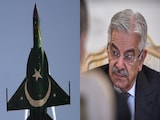"What's Rashid Khan's age?" I asked my dad, who is a serious cricket fan. "32 or so..." was his answer. "Wrong," I said.
My dad and my nani (maternal grandmother) were born in Bannu, a town in North Waziristan, close to Pakistan's border with Afghanistan. So, with 75 per cent of my genes from the North-West frontier, I am a natural fan of the Afghanistan cricket team. Also, I stay in Greater Noida, which has been their 'home-away-from-home' ground.
But back to Rashid Khan. Most people are surprised to hear that Afghan cricket's rock star is just 25. He was just 17 when he made his national ODI and T20 debut. At 19, he became ODI captain, the youngest to captain an international team in cricket history. At 19, he was the fastest to 100 ODI wickets in cricket history, at 21 the fastest to 100 T20 wickets in cricket history. At 22, he was declared ICC's T20 Player of the Decade, which is amazing as he was just 12 when the decade started.
Afghanistan Catches Them Young
Afghanistan routinely bloods its cricketers young. Their latest spin sensation Noor Ahmad, born in 2005, played in Australia's Big Bash League at 15. By 17, he was playing ODI and T20 cricket for his country, and is now part of Afghanistan's 'spin quartet' of Rashid, Nabi, Mujib and himself. He is not alone. His fellow spinner, Mujeeb ur Rahman, is just 22, and went for 4 crores in the IPL auction when he was just 17.
Afghanistan's stellar opening pair in this World Cup, Rahmanullah Gurbaz and Ibrahim Zadran, are both just 21. Zadran scored Afghanistan's first ODI century in World Cup history, that too against mighty Australia. Hasmatullah Shahidi, the Captain, is 29 today, but even he made his debut at 19, and is the first Afghan to score a double hundred in test cricket. Azmatullah Omarzai, who completes their hot 'batting quartet', is just 23. So yes, watch out for this team all over again at the 2027 World Cup.
Refugee Camps, the Cradle of Afghan Cricket
In Afghanistan, life is tough. You have to grow up quick and learn your skills the hard way. Ask their veteran all-rounder Mohammad Nabi. Ask their current assistant coach and former player, Raees Ahmedzai. Even ask Rashid Khan. All of them, at different times, spent years of their childhood in cramped refugee camps in Pakistan. Ahmedzai was born at a camp in Peshawar, after his family fled during the Russian invasion of Afghanistan in the 1980s. Nabi's family had done the same. Rashid's family was forced into Pakistan after the 9/11 bombings when US and NATO forces invaded Afghanistan to take on the Taliban and Al Qaeda.
There was only one silver lining - cricket - which these future stars learnt to play at the refugee camps. With severe restrictions on movement, their families strapped for resources, these children of conflict had little else to do other than focus on cricket. Without proper gear, often with no footwear, playing on concrete, learning from games on TV, they miraculously acquired world-class skills.
Through the years of conflict - even as Kabul lurched from Taliban control, to US and NATO powers, to the hands of a tribal coalition, to being a rag-tag democracy, and then back to Taliban rule - cricket sprang roots in Afghanistan, and somehow survived. In fact, it did more than survive. Thriving on the raw talent and passion of the game's pioneers, the country made a mark at every level, making it hard for the ICC to look away. The country gained ODI status in 2009, qualified for the U-19 World Cup in 2012, and got full ICC test-cricket playing member status in 2017.
Just six years later, they beat three former World Cup winning teams - England, Pakistan and Sri Lanka - convincingly. They even had mighty Australia tottering at 91 for 7 until Glen Maxwell played the innings of his life, to deny Afghanistan a possible semi-final berth. No team went past 300 against them, and their confident, classy batting has won many fans.
Rashid Khan and Taliban
There are many more challenges before a Rashid Khan. The elephant in the room is the Taliban. Critics want a massive cricket star like Rashid Khan, with close to 9 million followers on Instagram, whom the world media and cricket media follow closely, to speak out against the highly conservative Taliban regime. Even more so against its treatment of women, whose rights to education and employment, and freedom of movement and clothing, are now severely curtailed.
Some would argue that this ask from Rashid Khan is not realistic. Militarily, the West has conceded that it could not tackle the Taliban. Politically, while the world makes the 'right noises', there is almost nothing that Afghanistan's foes or friends seem to be able to do by way of influencing, changing, or even softening the Taliban's regressive ideology. Civil society is unable to take on the Taliban, as the judiciary, the law, the police, media, every institutional pillar is controlled by the Taliban.
Should Rashid Khan put his career, or even the future of Afghanistan cricket at risk by speaking out against the Taliban, who also control cricket in the country? Just as the Taliban, almost on a whim, recognized cricket in 2000, they could as easily ban the game again. Also, does Rashid Khan's star status make him immune to being targeted, even arrest? Not really. If he chose to be a critic from outside the country, which would certainly end his career, the Taliban could still target his family members at home.
Afghan Cricketers are Not Politically Numb
Rashid and Nabi also got on Twitter in 2021, as Taliban rule returned. Not naming the Taliban directly, they put out tweets calling on the world community to save Afghanistan from 'chaos'. But, since then, it has clearly not been possible for them to speak out.
And yet, Afghanistan's cricketers are not politically numb. Right through the 2023 World Cup, we have seen news of Pakistan sending 'undocumented' Afghan refugees back to Afghanistan. It's not a small number - an estimated 1.7 million. Sadly, most of them are 'undocumented' for no fault of theirs, and many face the prospect of being prosecuted by the Taliban on their return, or having no livelihood prospects. Afghanistan's cricketers have repeatedly dedicated their wins, and their Man of the Match awards to the plight of their refugee fellow citizens.
Even so, for a Rashid Khan, and let us remember he is just 25, activism will mean walking a very thin, almost invisible, line.
Afghanistan Women's Cricket - Worth Batting For
A possible starting point for him could be the cause of women's cricket in Afghanistan, which is all but dead. A women's team was created in 2010, only to be disbanded in 2014 due to conservative pressure, at a time when the Taliban was not even in power. In 2020, there was progress again, as 25 women players were awarded contracts by the Afghan Cricket Board (ACB), and camps were held to select a national team. But after 15 August 2021, when the Taliban rolled into Kabul, all sports for women was banned.
Several Afghan women cricketers have since left the country, and most of them have re-grouped in Australia. One of their aims is to get recognition and funding from ACB, and get Afghan women's cricket kick-started again. Rashid Khan could reach out to ACB for a discussion, or start mentioning the aspirations of the women's team on social media, or in the many media interviews he does, could use his star power to reach out to the Taliban and spin a miracle. Cricket fans, after seeing the Afghan men in action, can only imagine what talent is waiting to be unlocked in Afghanistan's women's cricket.
I'd like to believe that even the most regressive regimes need to stay popular by backing a popular sport, and even the most regressive rulers do enjoy rubbing shoulders with rock stars.
(Rohit Khanna is a journalist, commentator and video storyteller. He has been Managing Editor at The Quint, Executive Producer of Investigations & Special Projects at CNN-IBN, and is a 2-time Ramnath Goenka award winner)
Disclaimer: These are the personal opinions of the author.















